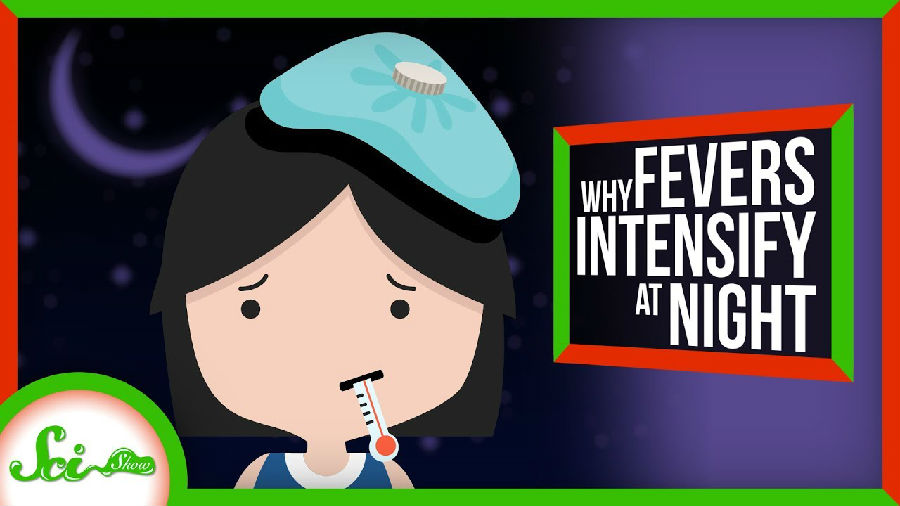Thanks to Brilliant for supporting this episode of SciShow! Go to Brilliant.org/SciShow to learn more.
感谢Brilliant对本期《科学秀》的支持。前往 Brilliant.org/SciShow了解更多。
Being sick sucks. But you might have noticed it often sucks more at night.
生病很讨厌,但你或许注意到了,到晚上病情会更严重。
Maybe you can push through the day feeling just a little toasty and gross,
早上的你可能只是觉得有一点发热和恶心,
but after sunset, you're on a one-way bus to Fever Town. And that wasn't your imagination.
但日落过后,你就踏上了前往发烧小镇的单程车上。这可不是你的凭空想象。
Fevers do often rise at night, and that's largely because that's when our bodies naturally stoke their internal furnaces.
发烧确实经常发生在晚上,很大原因是因为晚上你的身体会给内部炉子添加燃料。
Your body temperature is controlled by your hypothalamus, a small region at the base of your brain.
你的体温由下丘脑控制,这是大脑底部的一个小区域。
It can sense the temperature of the blood that passes through it, and receives temperature information from your skin, too.
它可以感知流过血液的温度并接受来自皮肤的温度信息。
And it uses all this info, as well as chemical signals from your body, to calibrate your internal temperature to a cozy 37 degrees C.
它利用所有这些信息以及来自身体的化学信号将你体内的温度校正到舒适的37度。
But even when you're totally healthy, it doesn't keep your body temperature completely stable throughout the day.
即便身体完全健康,它也无法让你的体温全天保持完全稳定。
Instead, you fluctuate by up to half a degree Celsius in either direction
相反,你的体温会高或低半度
thanks to your body's circadian rhythm, essentially your body's internal clock.
这是因为你身体的生理节律—也就是身体的生物钟
That rhythm is controlled by a tiny region of the hypothalamus called the Suprachiasmatic Nucleus, or SCN for short,
这种节律由下丘脑的一个小区域—视交叉上核(SCN)控制,
which receives light and dark signals from nerve cells in your eyes as well as input from other parts of your brain.
该区域接收来自眼睛神经细胞的明暗信号以及大脑其他部分的输入信息。
Usually, these rhythms cause our body's temperature to dip to its lowest point around 4 o'clock in the morning,
通常,这些节律使我们的体温在凌晨4点左右降到最低点
and then to the high end of the normal range around 6 o'clock at night. And this daily cycle doesn't stop when you're sick.
然后在晚上6点左右到达正常范围的高端。这种日常循环在你生病的时候也不会停止。
So during fever, not only is your temperature elevated, it's still subject to that upward swing in the evening.
发烧的时候,你的体温不仅升高了,而且在晚上还会上升。

And that's not all. Circadian rhythms also influence your immune system.
这还不是全部。生物周期节律也会影响你的免疫系统。
You see, fevers are triggered by substances called pyrogens. These can come from a few places.
你看,发烧由称为致热源的物质引起。这些致热源可以几个地方。
White blood cells can release them into the bloodstream when they sense an intruder.
当白细胞感觉到入侵者时,会将它们释放到血液中。
Or, might be emitted more directly by infected tissue or the pathogens themselves.
或者,可能更直接地由受感染的组织或病原体本身释放。
But wherever they're from, the effect is the same: they tell the hypothalamus to ramp your thermostat up.
但不管它们来自哪里,效果是一样的:它们告诉下丘脑调高你的恒温器。
And because of that, the daily cycles of your immune system could add to your nightly temperature spike.
因此,这种免疫系统的日常循环会增加你夜间的体温峰值。
You literally have more white blood cells at night, for example,
比如,晚上你的白细胞会增加,
and studies have found some pyrogen levels also tend to spike in the evening.
并且研究发现些热原水平也会在晚上达到高峰。
Now, there are exceptions to this nightly fever pattern, of course.
当然夜间发烧也有例外。
Bacterial pneumonia and typhoid fever, for instance,
比如,细菌性肺炎和伤寒
typically cause fevers that stay elevated all day and night without that daily fluctuation.
通常会引起发烧并且整天整夜都处于高热状态,而不会出现日常波动。
And some kinds of malaria lead to fever spikes that occur on 2 or 3 day cycles instead of daily.
有些种类的疟疾会导致发烧高峰出现在2到3天的周期而不是每天。
So keeping track of how your temperature changes over time
所以随时记录温度的变化
could help your doctor figure out what's got you feeling so crummy.
可以帮助你的医生弄清你难受的原因。
And in general, you should probably check your temperature at the same time every day
通常,你应该每天同一时间检查你的体温
if you really want to know if you're getting better or worse.
如果你真的想知道病情变好变坏的话。
The best time is probably somewhere between 6 and 8 pm, since that's when your temp will likely be the highest.
测量体温的最佳时间或许是晚上6到8点,因为此时你的体温可能到达了最高值。
Of course, I am not a doctor, so if you have any concerns about a fever at any time of day,
当然,我并不是医生,所以如果你担心发烧的话,
you should definitely consult a healthcare professional.
你应该咨询医护专业人员。
And if you do find yourself stuck at home thanks to a particularly nasty bug,
如果你发现自己因为一个特别讨厌麻烦而被困在家里
you might as well do something fun with your downtime.
你或许也应该在此时做些有趣的事。
Like, take a course or two from Brilliant.org! You see, learning doesn't have to be dull.
比如,去Brilliant.org学习一两门课程。你看,学习并不一定是无聊的。
Brilliant offers a variety of engaging courses in math, science,
Brilliant提供各种课程,如数学、科学
and computer science that are designed for ambitious, curious people.
以及电脑科学,专为好奇人士设计的
For example, their puzzle science course teaches physics the fun way
例如,他们的解密科学课程就以一种有趣的方式教授物理
by getting you to solve puzzles about mirror reflections, laser tag, and making the perfect shot in a game of pool.
让你解决关于镜映成像、激光标签以及桌球中完美入框的难题。
Right now, the first 200 people to sign up at Brilliant.org/SciShow will get 20% off the annual Premium subscription.
现在前200名注册Brilliant.org/SciShow的观众可获得年度会员八折优惠。
And if you do, you'll also be supporting SciShow, so thanks!
注册Brilliant的同时也是在支持我们,所以,感谢大家!


